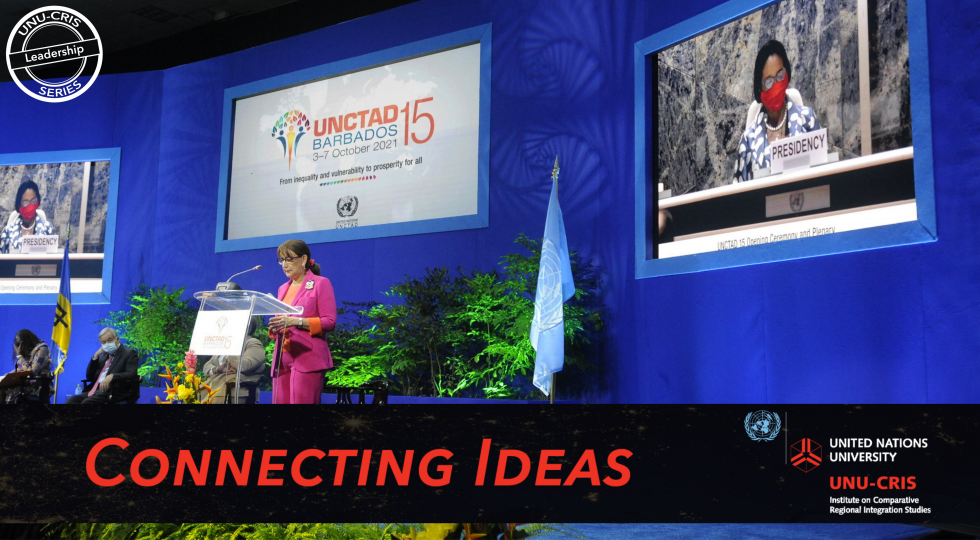UNCTAD 15 endorsed the Bridgetown Covenant and the Spirit of Speightstown

Rebeca Grynspan, Secretary-General of UNCTAD during the UNCTAD15 Opening Plenary (4 Oct 2021). Image credit: Flickr/Barbados Government Information Service

Yuefen Li
Senior Advisor
South-South Cooperation and Development Finance, South Centre
26 October 2021 | #21.21 | The views expressed in this post are those of the author and may not reflect those of UNU-CRIS.
The original version of this contribution was published by the South Centre.
The fifteenth session of the quadrennial conference for the United Nations Conference on Trade and Development (UNCTAD) was held virtually and hosted in Bridgetown, Barbados from 3 to 7 October 2021 under the theme of “From inequality and vulnerability to prosperity for all”.
The conference took place at a critical moment when progress made in pursuit of the Sustainable Development Goals has suffered severe setback as the devastating impact of the COVID-19 pandemic has pushed 120 million people into extreme poverty and led to regression in areas such as health, education and nutrition. The world is facing a multitude of challenges including rising inequality within and among countries, vaccine nationalism in the face of raging COVID-19 variants, escalated debt burden for many developing countries, ravages of climate change and weakening multilateralism.
In addition to laying out the mandates for UNCTAD in the coming four years, the conference provided directions for how to recover from the COVID-19 pandemic in a more inclusive, greener, sustainable and resilient way for developing countries.
After months of negotiations and intense discussions during the conference, Member States of UNCTAD eventually endorsed the Bridgetown Covenant which has reaffirmed the important role of UNCTAD as the focal point in the United Nations for the integrated treatment of trade and development and interrelated issues in the areas of finance, technology, investment and sustainable development. Most importantly, the Bridgetown Covenant, built on the Nairobi Maafikiano of 2016 - the outcome document for UNCTAD 14, will guide the formulation and execution of UNCTAD’s programs of work in the coming years to promote economic development and avoid a lost decade for developing countries. The Bridgetown Covenant has mandated UNCTAD to continue its work through the three pillars - research and analysis, consensus building and technical cooperation - to contribute to the implementation, monitoring and review of the 2030 Agenda for Sustainable Development and the relevant Sustainable Development Goals. It is encouraging that the outcome document underscored the importance of the research and analysis pillar of UNCTAD. Being a United Nations institution mandated to promote the interests of developing countries, UNCTAD’s analytical work through monitoring of global, regional and national trends and policies and its policy recommendations have been valuable to developing countries and also have been an alternative voice at times in the development discourse.

Image credit: Flickr/Barbados Government Information Service
The political declaration of UNCTAD 15 - the Spirit of Speightstown - has spelt out the development challenges facing the world and emphasized the need for a revitalized covenant for development and called for international cooperation. As noted by the newly appointed UNCTAD Secretary-General Rebeca Grynspan at the World Leaders Summit, the world stands at a critical point in the history of multilateralism amid many other challenges.
UNCTAD 15 had a series of high-level events including the World Leaders Summit, five ministerial roundtables on important topical issues relating to development, the Civil Society Forum, the Global Commodities Forum, the Gender and Development Forum, the Youth Forum and the Creative Economy and Trade Digitalisation Forum. The animated discussions at these events revealed convergent views on many of the most topical and pressing issues. For instance, world leaders called for COVID-19 vaccine equity and greater action against debt and climate crises.
On the occasion of UNCTAD 15, virtual ministerial conferences for the Group of 77 (G77) and China, the Least Developed Countries and Small Island countries were held, respectively. In its Ministerial Declaration to UNCTAD 15, the G77+China highlighted the importance of setting a developmental narrative on issues affecting global trade and the global economy and hoped that the Bridgetown Covenant would provide a framework for moving from actions to concrete results in tackling the multitude of economic and social challenges that developing countries are facing. These actions should include the reform of the multilateral system and restore the important role of UNCTAD.
The South Centre, being an intergovernmental think tank for developing countries, actively provided substantive support in the preparatory process for UNCTAD 15. In the ministerial declaration of G77+ China to UNCTAD 15, there is the decision to set up the Gamani Corea Forum to serve as the principal mechanism for the preparations for the future actions and to better address the strategic issues confronting developing countries to advance their collective thinking and collective action. In this context, the Geneva Chapter of G77+China is called upon to work with UNCTAD, the South Centre, as well as other friends in Geneva, to organize regular sessions of the Forum at a high-level standing. The South Centre stands ready to provide support to the Geneva Chapter and Member States of G77+China in this endeavor.
